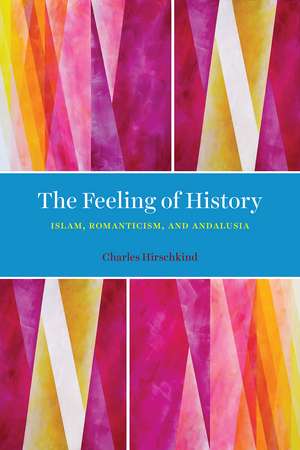The Feeling of History: Islam, Romanticism, and Andalusia
Autor Charles Hirschkinden Limba Engleză Paperback – 4 dec 2020
Against this xenophobic tendency, The Feeling of History examines the idea of Andalucismo—a modern tradition founded on the principle that contemporary Andalusia is connected in vitally important ways with medieval Islamic Iberia. Charles Hirschkind explores the works and lives of writers, thinkers, poets, artists, and activists, and he shows how, taken together, they constitute an Andalusian sensorium. Hirschkind also carefully traces the various itineraries of Andalucismo, from colonial and anticolonial efforts to contemporary movements supporting immigrant rights. The Feeling of History offers a nuanced view into the way people experience their own past, while also bearing witness to a philosophy of engaging the Middle East that experiments with alternative futures.
| Toate formatele și edițiile | Preț | Express |
|---|---|---|
| Paperback (1) | 222.42 lei 6-8 săpt. | |
| University of Chicago Press – 4 dec 2020 | 222.42 lei 6-8 săpt. | |
| Hardback (1) | 670.48 lei 6-8 săpt. | |
| University of Chicago Press – 4 dec 2020 | 670.48 lei 6-8 săpt. |
Preț: 222.42 lei
Nou
Puncte Express: 334
Preț estimativ în valută:
42.57€ • 43.97$ • 35.43£
42.57€ • 43.97$ • 35.43£
Carte tipărită la comandă
Livrare economică 25 martie-08 aprilie
Preluare comenzi: 021 569.72.76
Specificații
ISBN-13: 9780226746951
ISBN-10: 022674695X
Pagini: 216
Ilustrații: 1 halftones
Dimensiuni: 152 x 229 x 28 mm
Greutate: 0.3 kg
Ediția:First Edition
Editura: University of Chicago Press
Colecția University of Chicago Press
ISBN-10: 022674695X
Pagini: 216
Ilustrații: 1 halftones
Dimensiuni: 152 x 229 x 28 mm
Greutate: 0.3 kg
Ediția:First Edition
Editura: University of Chicago Press
Colecția University of Chicago Press
Notă biografică
Charles Hirschkind is associate professor of anthropology at the University of California, Berkeley. He is the author of The Ethical Soundscape: Cassette Sermons and Islamic Counterpublics.
Cuprins
Introduction
1 The Political Cartography of Andalucismo
2 The Difficult Convivencia of Spanish History
3 Sounding out the Past
4 The Universe from the Albayzín
Conclusion
1 The Political Cartography of Andalucismo
2 The Difficult Convivencia of Spanish History
3 Sounding out the Past
4 The Universe from the Albayzín
Conclusion
Acknowledgments
Notes
Bibliography
Index
Notes
Bibliography
Index
Recenzii
"Hirschkind questions cultural, linguistic, and even geographic boundaries between contemporary Spain, Europe, and the Arab world, which is sure to interest scholars of medieval Europe, professional historians, students of Spanish politics, and anyone concerned with issues of multicultural identity. . . . Highly recommended."
“With a marvelous confluence of sense and sensibility, Hirschkind offers careful correction to the courses we too readily navigate from the past. Speaking directly to the resonance and imbrication of ‘Islam’ and ‘Europe’ in the sounds and edifices of Granada, The Feeling of History is a luminous, deeply thoughtful, and unusually thought-provoking account of the salience of historical receptivity and imagination for contemporary ethical, aesthetic, and political life everywhere.”
“The Feeling of History is an utterly original and exciting book. Hirschkind writes with great sensibility, subtly demonstrating the education that he and his subjects go through in their respective journeys. His erudite treatment of layers of Arabic and Islamic culture, and of a vast range of Spanish history, culture, and politics, is both subtle and rich. No other book achieves so much in so many registers, and no anthropologist has done this kind of multilayered work.”
"In a tightly argued and nuanced text, Hirschkind analyzes Andalucismo as a sort of 'historical therapeutics' that aims to uncover the buried pasts of Spain’s heterogenous communities... [His] sensorial approach to the philosophical sensibilities at the crossroads of history, memory, and the contested politics of Spain and 'Fortress Europe' offers scholars new avenues to approach old questions about belonging, interfaith relations, tradition, heritage, and narrative."
